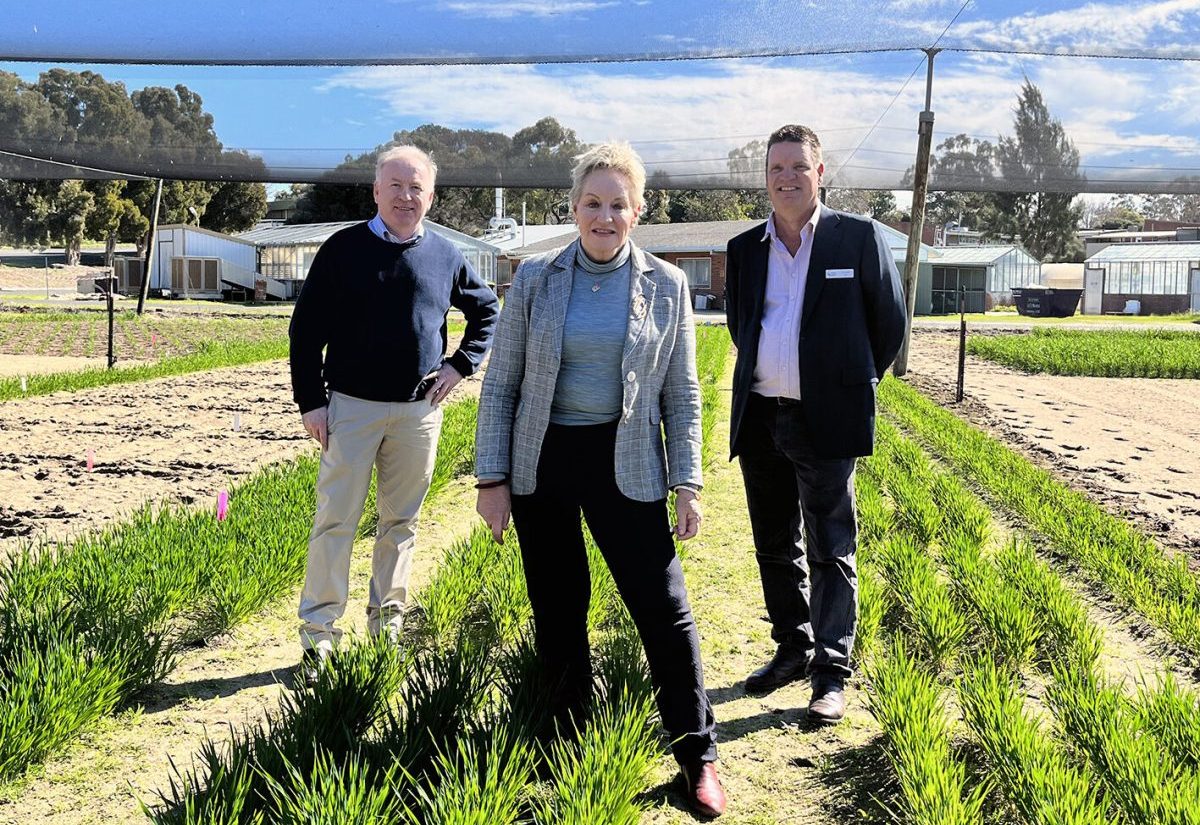
GRDC managing director Nigel Hart, WA Agriculture and Food Minister Alannah MacTiernan and GRDC Western Panel chair Darrin Lee at the WA Farming Systems launch. Photo: GRDC
THE WESTERN Australian Government and the Grains Research and Development Corporation (GRDC) have launched a $20.4-million research project designed to give grain growers in low and medium-rainfall zones new insights into farming systems practices that increase profit, manage risk and consider greenhouse gas (GHG) emission options.
Announced on Tuesday, the Western Australian Farming Systems project will use a whole-of-farm research approach to support growers in making informed business and agronomic decisions.
WA Agriculture and Food Minister Alannah MacTiernan said the WA Government has injected $12M in the five-year WA Farming Systems project, while the GRDC has committed $8.4M.
“The WA grains industry is at a critical juncture exposed to increasing pressures from climate change, high input costs and a volatile commodity market, as well as customer expectations for sustainably produced, low-emission food products,” Ms MacTiernan said.
“The WA Farming Systems project will assist our biggest agricultural industry to take on these pressures head on, so our grain growers can remain ahead of the game with research-based production practices that are both profitable and sustainable.
“I am pleased to see that the project will embrace on-ground trials to support future scenario modelling, providing growers with the empirical evidence required to make informed decisions when modifying their operations to strengthen business resilience.”
Farm sustainability
GRDC managing director Nigel Hart said the new investment had been developed in response to WA growers’ requirements for an integrative R&D project that looked at whole-of-farm implications of elements such as different crop rotations and agronomic management practices.
“This WA farming systems project will explore crop rotations, crop types, timing of seeding in a changing climate, potential weeds and disease management costs and consequences, and an understanding of the GHG emissions intensity of these different systems,” Mr Hart said.
“The aim is to help growers get on the front foot in making business and agronomic decisions in changing climatic conditions in ways that enhance on-farm profitability and sustainability.”
The project aims to have growers in the low and medium-rainfall zones of WA adopting and integrating agronomic and systems innovations by the year 2026, which could support a 10-20 per cent improvement in farm profitability.
The research will also help growers understand the GHG-emissions intensity of different farming systems.
Science-based tools
Department of Primary Industries and Regional Development farming systems innovation manager David Ferris said the project would provide grain growers with scientifically proven tools and strategies to adapt their operations with confidence to the changing climate and market environment so their businesses can remain profitable, sustainable and competitive.
“With increasing demand for ethically produced food, alongside the challenges of climate variability, now is the time to examine the risks and opportunities for future grain production so industry can be at the forefront of research advances and build a strong and secure future,” Dr Ferris said.
GRDC manager agronomy soils and farming systems – west, Uys Lourens, said growers in low and medium-rainfall regions needed to continue to adapt to strategic risks to remain internationally competitive, sustainable and profitable.
“In order to do this, growers need the latest, best-practice knowledge on how to manage current production system risks and prepare for potential future scenarios,” Dr Lourens said.
“A key part of this project will be engaging with growers and advisers.
“We will start with a consultation phase that will ensure this research focuses on locally relevant constraints and opportunities to help growers make informed decisions in complex farming systems.”
The project’s initial engagement phase started in May this year and will run through until October.
It includes consultation with growers through regional workshops facilitated by consultants AgInnovate, a survey, and grower group engagement, as well as the establishment of local regional innovation groups for each of the three target regions based in Merredin (low rainfall), Katanning (medium rainfall – south) and Geraldton (medium rainfall – north).
Source: WA Government, GRDC



HAVE YOUR SAY